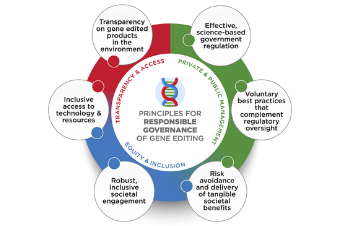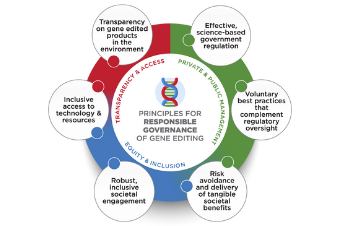NGOs Outline Principles for Governance of Gene Edited Products for Agriculture and the Environment

Responsible Governance of Gene Editing in Agriculture and the Environment
Biotechnology, which includes gene editing and other technologies, has the potential to address urgent food security, environmental, and human health dilemmas. However, these technologies also raise potential for societal concerns, environmental and health risks, and conflicts with cultural and spiritual values. Previous experience with the introduction of genetically modified organisms (GMOs) into the food system have in some instances resulted in public mistrust, underscoring the need for more transparency, better governance, and oversight of these technologies when they are deployed.
To address these potential concerns, representatives of six conservation and consumer non-governmental organizations developed six principles for responsible governance of gene editing in agriculture and the environment, which were published in an article for Nature Biotechnology (read the news release about the article). The authors of the article include representatives from the Center for Science in the Public Interest, Consumer Federation of America, Environmental Defense Fund, National Wildlife Federation, The Nature Conservancy, and World Wildlife Fund U.S.
The principles outlined by the NGOs focus on gene-editing governance in the public and private sectors in the U.S. context, recognizing governance in the United States can influence outcomes elsewhere. Underscoring the timeliness of discussion of principles for gene editing, the organizations note that several developers are currently poised to introduce gene-edited products into commerce and that the U.S. Department of Agriculture recently substantially deregulated gene-edited plants and proposed a similarly minimal oversight system for gene-edited animals.
Principles
The principles consider issues of private and public risk management, equity and inclusion, and transparency and access. They include:
- Gene editing technologies should be applied safely and ethically; care should be taken to avoid substantial risk and deliver tangible societal benefits.
- Robust, inclusive societal engagement is essential.
- Effective, science-based government regulation is required for realizing the full benefits of gene editing and managing for risks.
- Voluntary stewardship and best practices should supplement regulatory oversight through engagement, transparency, and product assessments that consider a full range of risks and benefits (health and safety, social, economic, and ecological) prior to any release into the environment.
- The public should have access to clear information identifying which gene editing applications are in use in food, agriculture, and the environment.
- Inclusive access to gene editing technology and resources can help drive societal benefit.
Read the following position paper further explaining the principles and the factors considered in their development. This fact sheet also provides a streamlined overview of the principles.
About the NGO Gene Editing Roundtable
The NGO Gene Editing Roundtable is an informal network of U.S.-based food-, agriculture-, and/or conservation-focused NGOs concerned with the responsible governance gene editing and other biotechnologies recognizes the potential societal benefits of gene editing technologies, while acknowledging their potential risks. Facilitated by Keystone Policy Center, the roundtable provides a forum for peer-to-peer engagement on gene editing policy and science to enhance organizational knowledge and capacity as well as identify and advance shared interests. On an opt-in basis, NGOs strategize on and conduct coordinated outreach to other organizations and sectors interested in these topics, for example through comment letters and meetings.
For more information about the NGO Roundtable on Gene Editing in Agriculture and the Environment, or about emerging gene editing technologies, please contact Julie Shapiro, director of the Emerging Technologies Program at the Keystone Policy Center.


 Shelby Coffey III is a distinguished journalist, media executive, and thought leader whose career has helped shape the landscape of American news and public discourse. Over several decades, Coffey has held some of the most influential roles in journalism, including serving as editor of the Los Angeles Times, executive vice president of ABC News, and deputy managing editor of The Washington Post. His editorial leadership extended to key roles as president of CNN Financial News, editor of the Dallas Times Herald, and U.S. News & World Report.
Shelby Coffey III is a distinguished journalist, media executive, and thought leader whose career has helped shape the landscape of American news and public discourse. Over several decades, Coffey has held some of the most influential roles in journalism, including serving as editor of the Los Angeles Times, executive vice president of ABC News, and deputy managing editor of The Washington Post. His editorial leadership extended to key roles as president of CNN Financial News, editor of the Dallas Times Herald, and U.S. News & World Report. Effective March 1, 2025, Thomas J. Vilsack, former United States Secretary of Agriculture and Governor of Iowa, became the first Chief Executive Officer for the World Food Prize Foundation. In this new role, Governor Vilsack is focusing on expanding the Foundation’s global network, and will further position the Foundation as a leader in addressing global food and nutrition insecurity, continuing his lifetime of public service.
Effective March 1, 2025, Thomas J. Vilsack, former United States Secretary of Agriculture and Governor of Iowa, became the first Chief Executive Officer for the World Food Prize Foundation. In this new role, Governor Vilsack is focusing on expanding the Foundation’s global network, and will further position the Foundation as a leader in addressing global food and nutrition insecurity, continuing his lifetime of public service. Jerry Steiner has spent 40 years involved in agriculture following growing up on a Wisconsin dairy farm. He began his career with Monsanto, in multiple business leadership roles. From 2003-2013 he served as a member of the Executive team, as the company’s Executive Vice President of Sustainability and Corporate Affairs. He led the company’s global Government, Public and Industry Affairs teams across the 70 countries where Monsanto conducts business. This experience got Jerry connected to the Keystones centers work in agriculture. Key among his responsibilities were shaping the company’s public policy and building partnerships aimed at helping farmers around the world produce more food, while conserving valuable resources like water and energy. Two unique partnership that developed under his leadership were drought tolerant corn with 5 African countries, CIMMYT and the Gates foundation, and a building a sustainable business model in Brazil with the value chain leading to significant multi-company investment and soybean varieties that can protected themselves.
Jerry Steiner has spent 40 years involved in agriculture following growing up on a Wisconsin dairy farm. He began his career with Monsanto, in multiple business leadership roles. From 2003-2013 he served as a member of the Executive team, as the company’s Executive Vice President of Sustainability and Corporate Affairs. He led the company’s global Government, Public and Industry Affairs teams across the 70 countries where Monsanto conducts business. This experience got Jerry connected to the Keystones centers work in agriculture. Key among his responsibilities were shaping the company’s public policy and building partnerships aimed at helping farmers around the world produce more food, while conserving valuable resources like water and energy. Two unique partnership that developed under his leadership were drought tolerant corn with 5 African countries, CIMMYT and the Gates foundation, and a building a sustainable business model in Brazil with the value chain leading to significant multi-company investment and soybean varieties that can protected themselves. Jennifer Morris is the Chief Executive Officer of The Nature Conservancy, leading a team of nearly 6,000 staff working in more than 80 countries and territories tackling the dual crises of the
Jennifer Morris is the Chief Executive Officer of The Nature Conservancy, leading a team of nearly 6,000 staff working in more than 80 countries and territories tackling the dual crises of the  Congressman Joe Neguse represents Colorado’s 2nd District in the U.S. House of Representatives. He was elected to his first term in November 2018, becoming the first Black Member of Congress in Colorado history. In December 2022, Rep. Neguse was elected by his colleagues to serve as Chair of the Democratic Policy and Communications Committee (DPCC), becoming the first Coloradan to serve in a senior elected leadership role in the House in over 85 years. He serves on the Natural Resources and Judiciary Committees, and was also appointed by House Minority Leader Hakeem Jeffries to serve as one of four Democrats on the prestigious Rules Committee. Rep. Neguse serves as Ranking Member on the House Subcommittee on Federal Lands, which he previously Chaired in the 117th Congress.
Congressman Joe Neguse represents Colorado’s 2nd District in the U.S. House of Representatives. He was elected to his first term in November 2018, becoming the first Black Member of Congress in Colorado history. In December 2022, Rep. Neguse was elected by his colleagues to serve as Chair of the Democratic Policy and Communications Committee (DPCC), becoming the first Coloradan to serve in a senior elected leadership role in the House in over 85 years. He serves on the Natural Resources and Judiciary Committees, and was also appointed by House Minority Leader Hakeem Jeffries to serve as one of four Democrats on the prestigious Rules Committee. Rep. Neguse serves as Ranking Member on the House Subcommittee on Federal Lands, which he previously Chaired in the 117th Congress. Llewellyn King was born in Southern Rhodesia, now Zimbabwe. He went into journalism as soon as he turned 16, stringing for Time magazine and United Press in Africa.
Llewellyn King was born in Southern Rhodesia, now Zimbabwe. He went into journalism as soon as he turned 16, stringing for Time magazine and United Press in Africa. Steven Williams is the Chief Executive Officer of PepsiCo North America, overseeing a more than $48 billion business that spans PepsiCo’s Foods and Beverage operating units. His leadership encompasses more than 125,000 associates and over 900 locations across the U.S. and Canada. Steven joined PepsiCo in 2001 as part of PepsiCo’s acquisition of the Quaker Oats Company, which he joined in 1997, and has held leadership positions of increased responsibility since.
Steven Williams is the Chief Executive Officer of PepsiCo North America, overseeing a more than $48 billion business that spans PepsiCo’s Foods and Beverage operating units. His leadership encompasses more than 125,000 associates and over 900 locations across the U.S. and Canada. Steven joined PepsiCo in 2001 as part of PepsiCo’s acquisition of the Quaker Oats Company, which he joined in 1997, and has held leadership positions of increased responsibility since.